DrumPower Against Violence
Drumming helps young adolescents overcome social differences,
boosts their self-confidence and enhances social peace
by Alexandra Senfft
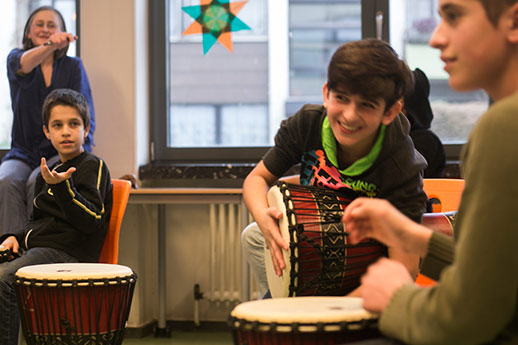
There is excitement today in one of the classrooms of Munich’s «Sonderpädagogisches Förderzentrum am Westpark» (support centre for special education): visitors have arrived, among them a photographer who will take pictures of the youngsters in the upcoming lesson. This afternoon’s class is dedicated to «DrumPower Against Violence», a musical approach to social integration and the prevention of violence, developed by Dr Andreas Wölfl, a well-known psychologist specialising in the treatment of children and adolescents, and a director of the Institute for Music Therapy at the Freies Musikzentrum in the centre of the Bavarian capital Munich.
During the course of his decades-long clinical career Wölfl applied music and movement to therapy because he became aware that it helped obtaining access to deprived adolescents who were susceptible to violence. Wölfl introduced musical elements in the interaction with his young patients, with good results. «In order to progress in therapy I realized it is imperative coming into close contact with the individual personality and the personal interests of the adolescents», says the graduated music therapist. Therapeutic success was confirmed as an effective tool for preventing violence. Wölfl then gradually introduced his approach into the project work of «Freies Musikzentrum» in Munich. Between 2009 and 2012 two pilot studies were conducted in two Bavarian grammar schools, funded by the Castringius and the IKEA foundation as well as the Barbara Weidinger Music Foundation. The resulting empirical studies demonstrated a sound conceptual base for the work. Wölfl and his colleagues at the Institute for Music Therapy subsequently developed a specific program. Under the patronage of Christian Ude - at the time senior major of Munich – «DrumPower Against Violence» has in the meantime come into effect in academic high schools, in grammar schools and schools for special needs in Germany and abroad.
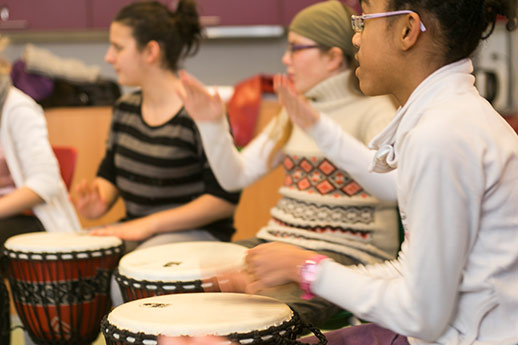
Reducing aggressive potential
In the Munich school centre for special education at Westpark «DrumPower» has been part of the curriculum since autumn 2013. In the wake of the introduction of all-day schools where pupils with specials needs are taught in a fixed group, the government of Upper Bavaria provided the school centre with additional lessons and financial aid. Director Beate Herberich introduced new topics into the individualized educational plan. Sports and music became integral parts of the curriculum. Herberich is satisfied: «Many of our pupils have stressed family backgrounds with a significant potential for violence. ‹DrumPower Against Violence› is instrumental in dissipating some of this aggression.» The enthusiastic head of school emphasizes the importance of assisting the children and adolescents in building relationships. The pedagogical approach of «DrumPower» suits this aim perfectly, she adds.
Her school is very much in line with the trend. Christian Pfeiffer, head of the Criminological Research Institute of Lower Saxony, commented in a report about children and adolescents who experienced violence: «Starting points for an effective prevention of violence among youth are projects that detect and prevent domestic violence or truancy as well as all-day schools which are dedicated to a motto: initiating a desire for life through sports, music and social training.» Diverse academic studies further substantiate the influence of active music-making in preventing aggression and violence.
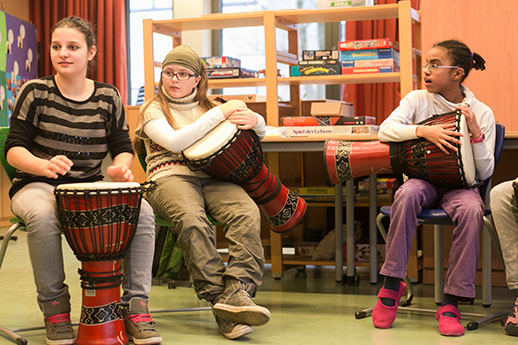
Motto «consideration»
Form teacher Gerhild Heyde and music therapist Henrike Roisch ask the pupils to fetch the instruments and find a seat. In the centre of the classroom is a pin board with guiding rules: to laugh at somebody, to scream or be insulting or smacking somebody is taboo. Being considerate of classmates is the priority. On top of the list of principles one sentence stands out: «When do I say «Stop»? The importance of this becomes clear quickly.
Finally all 13 pupils between 11 and 14 years are seated in a circle, with an African drum for each between the knees. A moment of silence and then the drumming commences, guided by Henrike Roisch. Some are hesitant, gentle, others forceful and energetic. A dynamic cooperation now unfolds: a hail of drums crescendos like a balloon being filled with air, infusing the room with sound – and is abruptly broken off as one of the pupils calls «Stop!» – Silence.
Then it is another pupil’s turn to initiate the drum swirl and to terminate it at any chosen moment with the magic word «Stop!» In a metaphorical sense the youngsters simulate with this exercise a growing conflict and learn to put an end to it. This trains their awareness of the other. They realize what it means to respect their schoolmates’ boundaries and – not least – to protect themselves by defining their own limits. On the drums the young adolescents orchestrate situations of everyday life, being led through this process by the music therapist. In most cases the topics they raise are related to problems they experience at school. In drummed disputes they can thus re-enact scenes for example of mobbing or marginalization. This approach enables them to reflect upon situations they could verbally not address and work through.
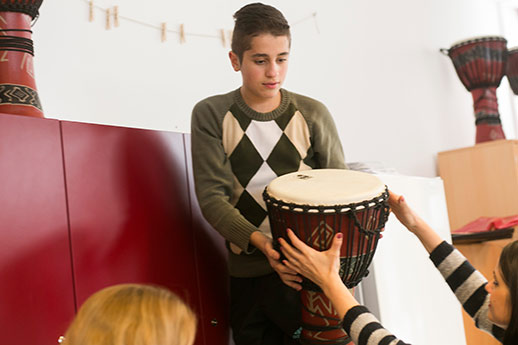
Making use of the non-verbal power of music
«Music can touch people non-verbally», says Andreas Wölfl. «It offers adolescents new grounds free of prejudice. It encourages even the very timid to participate in the group.» For Wölfl it is crucial «that they learn to listen to each other, that they make contact while playing and synchronise with each other. This way they learn how to control their emotions while their ability to bond and feel empathy grows. Furthermore the musical involvement with issues of violence and conflict produces certain alienation effects which allow for emotional distance and facilitate the development of constructive solutions.» Wölfl presented his concept in a recently published book: «Gewaltprävention mit Musik: Empirische Wirkungsanalyse eines musiktherapeutischen Projektmodells».
In the classroom new instruments come into play now: guitar, sound frog, xylophone and bells. «Who wants to conduct?» asks Henrike Roisch and immediately a youngster from amid the circle gets up, determining beginning, volume and end of the improvisation. The ensuing dynamic reveals quickly which of the adolescents is self-confident, reserved, quiet or vivacious and, most of all, how the group interacts. Peter Uffelman, director of «Competto» educational management, participated in conducting the pilot studies and he is convinced of the social impact of the project: «The strength of ‹DrumPower› is the interaction between the training of social bonding on the one hand and bolstering a pupil’s personality on the other: individuality and community spirit – both are being fostered. The participants discover their abilities, maybe even talent, and contribute to the joint process.»
Uffelmann detects the therapeutic effect right here: the experience of individual power evolving from the resource of collective action. «We do not primarily aim at preventing violence but at transferring social competence», says the coach, trainer and supervisor. In opposition to the Zeitgeist of optimizing oneself, he perceives in the project a great opportunity to bringing together schoolmates in a playful way, to make them close ranks and to cooperate instead of competing with each other. «Music has a universal language», says Uffelmann enthusiastically. «If you implement it positively, it will help integration and establish identities – one’s social, ethnic or religious background becomes irrelevant when the members of the group get involved in the social process with all their strengths and weaknesses. This is what I call social empowerment!» says Uffelmann.
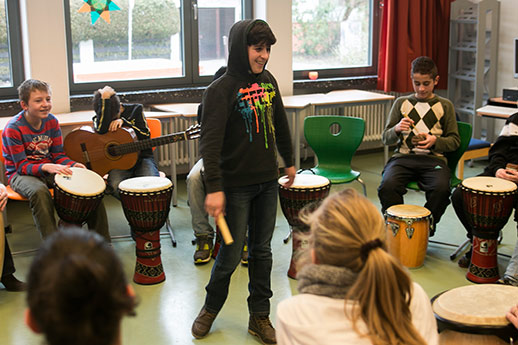
DrumPower is social empowerment
Most of the youngsters in Gerhild Heydes’ class have an immigrant background. Yet while drumming cultural, social or other differences between them do not seem to matter – all pupils contribute to the group dynamic process according to their character. «Stop!» however, has at this moment lost its spell. Some of the adolescents become distracted by the presence of the external visitors. Being observed by the camera creates in them a pressure to perform; their irritation is tangible and their insecurity is demonstrated by displacement activities. The usual lightness has evaporated and with it their concentration. «Some kids were overwhelmed with the situation», explains trainer Henrike Roisch. The music therapist and sociologist is very much aware of the fact that this nine months’ project has its ups and downs: «This is an emotional and cognitive learning process during which tensions and difficult moments cannot be avoided. The challenge and prospect of development is actually confronting the conflict and solving it», stresses the 48-year-old social worker who was trained to become a music therapist by Andreas Wölfl at Freies Musikzentrum.
Roisch and Heyde are themselves now strongly challenged because clown-like acting and increasing disturbance threaten to create havoc among the pupils. One girl leaves the classroom in response to some of the boys’ comments. The lesson is about to disintegrate. Now it is Henrike Roisch’s turn to exclaim «Stop!» She does so vigorously. Sternly she reproaches a few pupils for having broken some rules as noted on the pin board. «Don’t you think it would be a pity if we finished our «DrumPower» class this week on such a bad note and all went home feeling frustrated?» She then suggests ending the afternoon with the «reaction game». With this the trainer manages to engage the teenagers once again. One beat on the drum means it’s the turn of the person on your right, two beats the one on the left. Who fails to react or doesn’t get his or her count right is sidelined. Now hands are whirling across the drums, rapidly changing direction. In spite of a very long school day, concentration is fully restored. One especially disruptive boy shows a particular talent for focus and reaction. The pupils want to repeat the intense interplay several times, and then all of a sudden the lesson is over. The youngsters pass around the sound frog and each is invited to comment on the positive aspects of the lesson and on what they would like to improve the next time. Most of them, in effect, reflect about the unfortunate incident and admit to own errors. At last the class separates in good understanding.
This summer «DrumPower» at Förderzentrum am Westpark comes to an end. The project is based on an introductory phase, to be followed by moving the issue of violence into the focus of the class. The culminating point of the joint process is a workshop-style performance. The pupils are deeply involved in putting it together – they decide on the topics of the improvised scenes. «In the concluding performance we want to achieve that the adolescents adhere to their cause and are able to show this,» says head of the institute and of the project Andreas Wölfl. Usually they emerge from this process strengthened and more self-confident, building on the cooperation achieved and the collective appreciation of their efforts.
Criminologists are acutely aware of the fact that a lack of appreciation in a disintegrating society often leads to violence. It is scientifically proven that in this regard «DrumPower Against Violence» has a preventive effect. More than that, the project constructively uses the power of music to bolster adolescents’ personalities – for their own good and for the benefit of society.
Alexandra Senfft is a writer and journalist. She writes for German newspapers like DIE ZEIT, taz or FAZ and for German and international academic journals. In her book «Fremder Feind, so nah» (strange enemy, so close) she introduces dialogues between Palestinians, Israelis and Germans, and in «Schweigen tut weh» (silence is painful) she analyses the NS-history of her own family. Senfft is a member of the «Willy-Brandt-Kreis» and «Pakh – Study Group on Intergenerational Consequences of the Holocaust».
www.alexandra-senfft.de
© Photos: Volker Rebhan